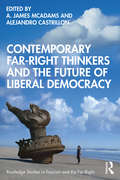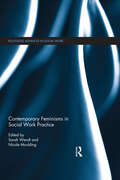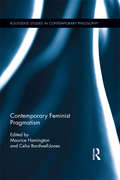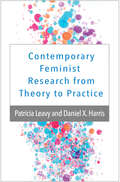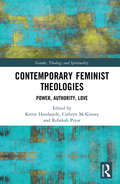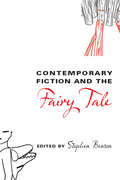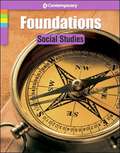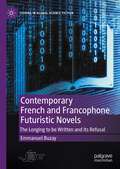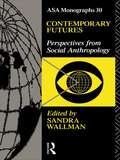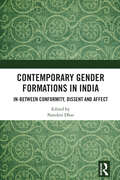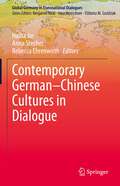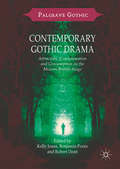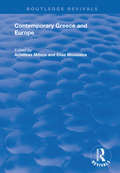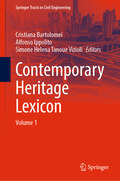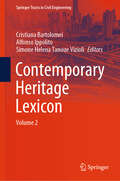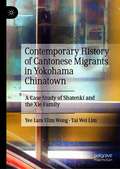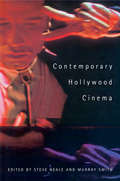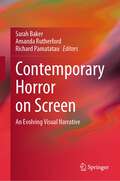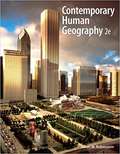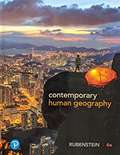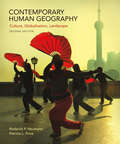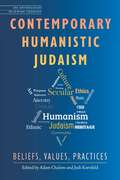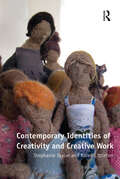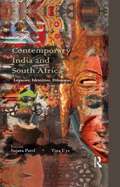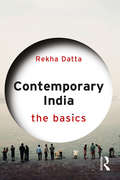- Table View
- List View
Contemporary Far-Right Thinkers and the Future of Liberal Democracy (Routledge Studies in Fascism and the Far Right)
by A. James McAdamsThis book is the first systematic analysis of the efforts of a broad range of contemporary far-right thinkers to popularize their critiques of liberal-democratic norms and institutions and make their ideas the subjects of sustained political and academic debate. The book focuses on outspoken thinkers in western and eastern Europe, Russia, the United States, Canada, and Australia. They include Alain de Benoist, Guillaume Faye, Götz Kubitschek, Pat Buchanan, Fróði Midjord, Jason Jorjani, contributors to the online magazine Quillette, and the elusive personality known as the Bronze Age Pervert. The book explores the diverse intellectual foundations of these thinkers’ positions, the similarities and differences in their ideas, and their prospects for influencing attitudes about democratic politics within their respective countries. It examines diverse movements and schools of thought, including the European New Right, Paleoconservatism, the Alt-right, Identitarianism, White nationalism, and antifeminism. Providing a much-needed global perspective, this book will be of considerable interest to students and scholars of populism, right-wing extremism, identity politics, fascism, racism, and conservatism.
Contemporary Feminisms in Social Work Practice (Routledge Advances in Social Work)
by Nicole Moulding Sarah WendtContemporary Feminisms in Social Work Practice explores feminism as core to social work knowledge, practice and ethics. It demonstrates how gender-neutral perspectives and practices obscure gender discourses and power relations. It also shows feminist social work practice can transform areas of social work not specifically concerned with gender, through its emphasis on relationships and power. Within and outside feminism, there is a growing assumption that equality has been won and is readily available to all women. However, women continue to dominate the ranks of the poor in developed and developing countries around the world; male perpetrated violence against women and children has not reduced; women outnumber men by up to three to one in the diagnosis of common mental health problems; and women continue to be severely underrepresented in every realm of power, decision-making and wealth. This worrying context draws attention to the ways gender relations structure most of the problems faced by the women, men and children in the day-to-day worlds in which social work operates. Drawing together key contemporary thinking about feminism and its place in social work, this international collection looks at both core curriculum areas taught in social work programs and a wide range of practice fields that involve key challenges and opportunities for future feminist social work. This book is suitable for all social work students and academics. It examines the nuanced nature of power relationships in the everyday and areas such as working with cross-cultural communities, mental health, interpersonal violence and abuse, homelessness, child protection, ageing, disability and sexuality.
Contemporary Feminist Pragmatism (Routledge Studies in Contemporary Philosophy)
by Maurice Hamington and Celia Bardwell-JonesThe notion of "feminist pragmatism" or "pragmatist feminism" has been around since Charlene Haddock Seigfried introduced it two decades ago. However, the bulk of the work in this field has been directed toward recovering the feminist strain of classical American philosophy, largely through renewed interest in the work of Jane Addams. This exploration of the origins of feminism and pragmatism has been fruitful in building a foundation for theoretical considerations. The editors of this volume believe the next logical step is the contemporary application to both theory and experience. Contemporary Feminist Pragmatism is the first book to address the modern significance of the nexus of feminism and pragmatism. The issues explored here include the relationship between community and identity, particularly around the impact of gender and race; reframing political practice regarding feminist pragmatist commitments including education, sustainability movements, and local efforts like community gardens; and the association between ethics and inquiry including explorations of Buddhism, hospitality, and animal-human relationships.
Contemporary Feminist Research from Theory to Practice
by Patricia Leavy Anne HarrisExploring the breadth of contemporary feminist research practices, this engaging text immerses the reader in cutting-edge theories, methods, and practical strategies. Chapters review theoretical work from around the globe and describe approaches to conducting quantitative, qualitative, and community-based research with participants; doing content or media analysis; and evaluating programs or interventions. Ethical issues are addressed and innovative uses of digital media highlighted. The focus is studying gender inequities as they are experienced by individuals and groups from diverse cultural, racial, and socioeconomic backgrounds, and with diverse gender identities. Delving into the process of writing and publishing feminist research, the text covers timely topics such as public scholarship, activism, and arts-based practices. The companion website features interviews with prominent feminist researchers. Pedagogical Features *Case examples of feminist research. *Running glossary of key terms. *Boxes highlighting hot topics and key points for practice. *End-of-chapter discussion questions and activities. *End-of-chapter annotated suggested reading (books, articles, and online resources). *Sample letters to research participants. *Appendix of feminist scholars organized by discipline.
Contemporary Feminist Theologies: Power, Authority, Love (Gender, Theology and Spirituality)
by Kerrie Handasyde Cathryn McKinney Rebekah PryorThis book explores the issues of power, authority and love with current concerns in the Christian theological exploration of feminism and feminist theology. It addresses its key themes in three parts: (1) power deals with feminist critiques, (2) authority unpacks feminist methodologies, and (3) love explores feminist ethics. Covering issues such as embodiment, intersectionality, liberation theologies, historiography, queer approaches to hermeneutics, philosophy and more, it provides a multi-layered and nuanced appreciation of this important area of theological thought and practice. This volume will be vital reading for scholars of feminist theology, queer theology, process theology, practical theology, religion and gender.
Contemporary Fiction and the Fairy Tale
by Stephen BensonConsiders the profound influence of fairy tales on contemporary fiction, including the work of Margaret Atwood, A.S. Byatt, Angela Carter, Robert Coover, Salman Rushdie, and Jeanette Winterson.
Contemporary Foundations: Social Studies
by Wright Group/McGraw-HillContemporary'sFoundationsseries helps students improve their basic skills. Each book provides skill instruction, offers interesting passages to study, and furnishes opportunities for practice.Foundationsprovides meaningful contexts for learning, using language which is easy to understand. AboutFoundations: Social Studies, Revised Edition : In Foundations: Social Studies, students will learn about world history, U.S. history, civics and government, geography, and economics. They will summarize, make predictions, infer the main idea of cartoons, find information on maps, and read various kinds of graphs. Background Information,Language Tips, andWriting Workshops will let students use what they already know as they read and write about social studies topics. The revised edition includes a new World History chapter. About the Series: In Foundations: Reading, students will read practical information, nonfiction, poetry, and short stories. They will learn to find the main point and the details; identify fact, opinion, and bias; make inferences; read photographs and cartoons; and understand rhythm, rhyme, plot, and theme. Writing Workshops, Language Tips, and prereading questions are designed to improve reading, writing, and thinking skills. In Foundations: Writing, students will practice the four steps to writing an essay: prewriting, drafting, revising, and editing. They will read and write five kinds of essays: descriptive essays, personal narratives, how-to essays, essays of example, and comparison-and-contrast essays. A language-skills workbook provides grammar, punctuation, and sentence structure practice. In Your Journal, With a Partner, and Language Tipswill help students become better writers, and better readers and thinkers as well. In Foundations: Science, students will learn about the human body, plant biology, physics, chemistry, and Earth science. They will practice putting events in order; reading diagrams, charts, and graphs; using the scientific method; and making comparisons and contrasts. Try It yourself!activities will guide students through simple experiments so they will have a better understanding of what they have been reading about. Writing Workshops and Language Tips will help students use their reading and writing skills to think about science topics. In Foundations: Social Studies, students will learn about world history, U.S. history, civics and government, geography, and economics. They will summarize, make predictions, infer the main idea of cartoons, find information on maps, and read various kinds of graphs. Background Information, Language Tips, and Writing Workshops will let students use what they already know as they read and write about social studies topics. The revised edition includes a new World History chapter. In Foundations: Math, students will practice using whole numbers, money, decimals, fractions, ratios, and percents. Exercises will help students review the addition, subtraction, multiplication, and division facts; round numbers; estimate answers; and solve word problems. Math Notes, On their Calculator, and Language Tips will help students improve math skills. The revised edition of Math is a major revision. The language has been updated to make the material even easier to follow than before. Foundations series at a glance
Contemporary French and Francophone Futuristic Novels: The Longing to be Written and its Refusal (Studies in Global Science Fiction)
by Emmanuel BuzayThis book sheds a new light on the metafictional aspects of futuristic and science fiction novels, at the crossroads of information and media studies, possible worlds theories applied to cognitive narratology, questions related to the criticism of post-humanity, and, more broadly, contemporary French and Francophone literature. It examines the fictional minds of characters and their conceptions of resistance to the anticipated worlds they inhabit, particularly in novels by Pierre Bordage, Marie Darrieussecq, Michel Houellebecq, Amin Maalouf, Jean-Christophe Rufin, Antoine Volodine, and Élisabeth Vonarburg. It also explores how corporal postures serve as a matrix for philosophical quests in novels by Amélie Nothomb, Alain Damasio, and Romain Lucazeau. More specifically, from the fictional readers’ points of view, it provides a critical approach to the mythologies of writing, in the wake of the French philosophical tales by authors including Cyrano de Bergerac and Voltaire, to question the traditionally expressed formulations of the mythologies of writing, that is, of the metaphors of the book (the book of life, nature, and the world), to rethink the idea of a humanity within its limits.
Contemporary Futures: Perspectives from Social Anthropology (ASA Monographs #No.30)
by Sandra WallmanIn industrial societies imagining the future is a serious business; our assumptions about the future govern the present management of domestic, national and global resources, and are projected, some would say inflicted, on societies whose visions are different. Contemporary Futures focuses not so much on whether the future can be known, but on interpreting the way we and others picture it. The contributors, all social anthropologists, explore the effects that this picture has on the present, on group identity and belief in the self and its survival, on our relationships with other cultures, and on the future itself. They provide a cross-cultural perspective on a range of futures visualised at this time and discusses the implications of
Contemporary Gender Formations in India: In-between Conformity, Dissent and Affect
by Nandini DharThe volume discusses critical issues surrounding the developments in gender movements in the last two decades in India following the Delhi rape case and the ensuing massive protests in December 2012. A critical documentation of some of the key moments surrounding the contemporary gendered formations and radicalisms in South Asia, the chapters span questions of class, caste, sexuality, digital feminisms, and conflict zones. The book looks at anger, protest, and imaginations of resistance. It showcases the ‘new’ visibility that digital spaces have opened up to lend voice to survivors who are let down by traditional justice mechanisms and raises questions regarding ‘individualized’ modes of seeking justice as against traditional ‘collective’ voices that have always been a hallmark of movements. The volume analyses and criticizes the complicity of the state and the court as agents of reinforcing gender violence – an issue that has not been theorized enough by activists and scholars of violence. Further, it also delves into the #MeToo movement and the LoSHA, as both have raised contentious, controversial, and often conflicting debates on the nature of addressing sexual harassment, particularly at the workplace. Calling for further debate and discussions of cyberspace, gender justice, sexual violence, male entitlement, and forms of neoliberal feminism, this volume will be of immense interest to scholars and researchers in the areas of women and gender studies, sociology and social theory, gender politics, political theory, democracy, protest movements, politics, media and the internet, political advocacy, and law and legal theory. It will also be a compelling read for anyone interested in gender justice and equal rights.
Contemporary German–Chinese Cultures in Dialogue (Global Germany in Transnational Dialogues)
by Haina Jin Anna Stecher Rebecca EhrenwirthThis book provides a unique perspective on contemporary German and Chinese cultural encounters. Moving away from highlighting exchanges between the two countries in terms of colonial connections, religious influences and philosophical impacts, the book instead focuses on the vast array of modern cultural dialogues that have influenced both countries, especially in literature, theatre and film. The book discusses issues of translation, adaptation, and reception to reveal a unique cultural relationship. The editors and contributors examine the existing programs and strategies for cultural interchange, and analyse how these shape or have shaped intercultural dialogue, and what kind of intercultural exchange is encouraged. This book is of interest to students and researchers of film and media studies, Sinophone studies, transnational studies, cultural studies and social and cultural anthropology.
Contemporary Gothic Drama: Attraction, Consummation and Consumption on the Modern British Stage (Palgrave Gothic)
by Kelly Jones Robert Dean Benjamin PooreThis ground-breaking volume is the first of its kind to examine the extraordinary prevalence and appeal of the Gothic in contemporary British theatre and performance. Chapters range from considerations of the Gothic in musical theatre and literary adaptation, to explorations of the Gothic’s power to haunt contemporary playwriting, macabre tourism and site-specific performance. By taking familiar Gothic motifs, such as the Gothic body, the monster and Gothic theatricality, and bringing them to a new contemporary stage, this collection provides a fresh and comprehensive take on a popular genre. Whilst the focus of the collection falls upon Gothic drama, the contents of the book will embrace an interdisciplinary appeal to scholars and students in the fields of theatre studies, literature studies, tourism studies, adaptation studies, cultural studies, and history.
Contemporary Greece and Europe (Routledge Revivals)
by Elias Mossialos Achilleas MitsosThis title was first published in 2000: Contemporary Greek society is characterized by an all-embracing trend for reform. This task, however, is constrained by problems of Greek polity rooted in the historical and political culture. This text explores the important facets of divergence between Greece and the EU, examining the process through which they affect the relative performance of the country in the economic, social, political and international relations fronts, together with significant attempts to modernize and rationalize internal and external policies and structures. The book is in five parts. In the first, introductory, section, Greece's Alternate Minister of Foreign Affairs, the late Yannos Kranidiotis, analyzes the fundamental objectives of Greek foreign policy, whilst the editors explore the challenges of EU membership for Greek domestic and foreign politics, and Greece's participation in the process of European integration. The second part deals with Greece and the EMU, the third analyzes the issues related to state modernization and adjustment. A fourth section examines the welfare state and related policies, and the final part analyzes Greece's foreign policy and external relations, with particular emphasis on the Balkans and Greek-Turkish relations.
Contemporary Heritage Lexicon: Volume 1 (Springer Tracts in Civil Engineering)
by Cristiana Bartolomei Alfonso Ippolito Simone Helena Tanoue VizioliThis book presents themes related to contemporary architecture as the results of diverse cultural influences and architectural legacies, manifested in a rich variety of styles, materials, and spatial perceptions. It consists of 24 chapters written by authors from various continents and contains the result of research highlighting contemporary architecture in relation to multiple aspects that are distinguished by their eclectic nature, characterized by the integration of diverse cultural and architectural influences. The book examines aspects involving material aspects, technologies, design, history, salvage, technologies, and digitization. The aspects covered are always filtered through research, which objectively integrates traditional and innovative approaches. Thus, the focus is to explore the contemporary lexicon not only in the field of architecture and engineering, but in all those areas where this theme can be read with a meaningful vision. Contemporary architecture is constantly evolving, reflecting the changing needs of society and anticipating the challenges of the future.
Contemporary Heritage Lexicon: Volume 2 (Springer Tracts in Civil Engineering)
by Cristiana Bartolomei Alfonso Ippolito Simone Helena Tanoue VizioliThe book presents themes related to contemporary architecture as the results of diverse cultural influences and architectural legacies, manifested in a rich variety of styles, materials, and spatial perceptions. It consists of 24 chapters written by authors from various continents and contains the result of research highlighting contemporary architecture in relation to multiple aspects that are distinguished by their eclectic nature, characterized by the integration of diverse cultural and architectural influences. The book examines aspects involving material aspects, technologies, design, history, salvage, technologies, and digitization. The aspects covered are always filtered through research, which objectively integrates traditional and innovative approaches. Thus, the focus is to explore the contemporary lexicon not only in the field of architecture and engineering but in all those areas where this theme can be read with a meaningful vision. Contemporary architecture is constantly evolving, reflecting the changing needs of society and anticipating the challenges of the future.
Contemporary History of Cantonese Migrants in Yokohama Chinatown: A Case Study of Shatenki and the Xie Family
by Tai Wei Lim Yee Lam WongThis book vividly portrays the past, current, and future development of Yokohama Chinatown through the context of its Cantonese residents, grounded through a family history. It is useful for both academic and non- academic readers who are interested in migration history, transformation of urban spaces, anthropological perspectives of integration of immigrants, diasporic studies and overseas Chinese studies. It is informative when considering the role of immigrant communities in the world today in the context of globalization stimulating cross-border movements and anti-globalization forces that act as push and pull factors for migration. It is also a study of harmonious integration of the overseas Chinese community in Yokohama and its ability to retain its own cultural traits, rights, rituals, traditions and dialect language in one of the most homogenous countries in the world. This increases the attractiveness of Yokohama City in terms of ethnic diversity, cosmopolitan multiculturalism and urban space renewal.
Contemporary Hollywood Cinema
by Murray Smith Steve NealeA comprehensive overview of the film industry in Hollywood today, Contemporary Hollywood Cinema brings together leading international cinema scholars to explore the technology, institutions, film makers and movies of contemporary American film making.
Contemporary Horror on Screen: An Evolving Visual Narrative
by Amanda Rutherford Sarah Baker Richard PamatatauThis book highlights how horror in film and television creates platforms to address distinct areas of modern-day concern. In examining the prevalence of dark tropes in contemporary horror films such as Get Out, Annabelle: Creation, A Quiet Place, Hereditary and The Nun, as well as series such as Stranger Things, American Horror Story and Game of Thrones, amongst numerous others, the authors contend that we are witnessing the emergence of a ‘horror renaissance’. They posit that horror films or programmes, once widely considered to be a low form of popular culture entertainment, can contain deeper meanings or subtext and are increasingly covering serious subject matter. This book thus explores how horror is utilised as a tool to explore social and political anxieties of the cultural moment and is thus presented as a site for contestation, exploration and expansion to discuss present-day fears. It demonstrates how contemporary horror reflects the horror of modern-day life, be it political, biological, social or environmental. A vital contribution to studies of the horror genre in contemporary culture, and the effect it has on social anxieties in a threatening and seemingly apocalyptic time for the world, this is a vital text for students and researchers in popular culture, film, television and media studies.
Contemporary Human Geography
by James M. RubensteinContemporary Human Geography is a beautifully crafted, modular springboard into essential human and cultural geography concepts, designed for the contemporary geography student. This brief, innovative text explores current human geography in the bold visual style that distinguishes Dorling Kindersley (DK) publications. Topics within each chapter are organized into modular, self-contained, two-page spreads. Together with the graphics, Rubenstein's efficient writing engages students, presenting information clearly without sacrificing the high-quality geography content essential to students and instructors.
Contemporary Human Geography
by James M. RubensteinThe fourth edition of Contemporary Human Geography builds on the strengths of the first three editions, while responding to user feedback to make important changes and improvements, and incorporating innovative features, current data, and new information. This edition brings substantial changes in both organization and content, as well as updated information and data. Especially important is the consideration of digital as well as paper versions of the book. This book has been designed to be legible--and attractive--in either paper or electronic format. Several features integrated into the text enhance student understanding and analytic skills.
Contemporary Human Geography: Culture, Globalization, Landscape
by Roderick P. Neumann Patricia L. PriceWith each chapter organized by five themes (region, mobility, globalization, nature-culture, cultural landscape), Contemporary Human Geography introduces students to geography concepts through fascinating topics such as the distribution of college sports, the relationship of beauty pageants and cultural identity, texting and language modification, and more, continually reinforcing geographers’ contributions to our understanding of how we live in a globalized, modern world. The authors frame this coverage using specific learning objectives to help students focus on essential concepts and prepare for class discussions, assignments, and exams. <P><P> Contemporary Human Geography comes with two of Macmillan’s online course spaces, allowing instructors to choose how much media and assessment they’d like to make available for their students, and at what price point. SaplingPlus offers innovative media content, curated assessments, and brand new mapping activities powered by Esri. Achieve Read & Practice combines the accessibility of a VitalSource e-book with our self-paced, formative quizzing engine, LearningCurve.
Contemporary Humanistic Judaism: Beliefs, Values, Practices (JPS Anthologies of Jewish Thought)
by Adam Chalom Jodi KornfeldOpening up multidimensional ideas, values, and practices of Humanistic Judaism to Jews of all backgrounds and beliefs, Contemporary Humanistic Judaism collects the movement&’s most important texts for the first time and answers the oft-raised question, &“How can you be Jewish and celebrate Judaism if you don&’t believe in God?&” with new vision. Part 1 (&“Beliefs and Ethics&”) examines core positive beliefs—in human agency, social progress, ethics without supernatural authority, sources of natural transcendence, and Humanistic Jews&’ own authority to remake their traditional Jewish inheritance on their own terms &“beyond God.&” Part 2 (&“Identity&”) discusses how Humanistic Judaism empowers individuals to self-define as Jews, respects people&’s decisions to marry whom they love, and navigates the Israel-Diaspora relationship. Part 3 (&“Culture&”) describes how the many worlds of Jewish cultural experience—art, music, food, language, heirlooms—ground Jewishness and enable endless exploration. Part 4 (&“Jewish Life&”) applies humanist philosophy to lived Jewish experience: reimagined creative education (where students choose passages meaningful to them for their bar, bat, or b mitzvah [gender-neutral] celebrations), liturgy, life cycle, and holiday celebrations (where Hanukkah emphasizes the religious freedom to believe as one chooses). Jewish seekers, educators, and scholars alike will come to appreciate the unique ideologies and lived expressions of Humanistic Judaism.
Contemporary Identities of Creativity and Creative Work
by Stephanie Taylor Karen LittletonCreative workers have been celebrated internationally for their flexibility in new labour markets centred on culture, creativity and, most recently, innovation. This book draws on research with novice and established workers in a range of specializations in order to explore the meanings, aspirations and practical difficulties associated with a creative identification. It investigates the difficulties and attractions of creative work as a personalized, affect-laden project of self-making, perpetually open and oriented to possibility, uncertain in its trajectory or rewards. Employing a cross-disciplinary methodology and analytic approach, the book investigates the new cultural meanings in play around a creative career. It shows how classic ideals of design and the creative arts, re-interpreted and promoted within contemporary art schools, validate the lived experience of precarious working in the global sectors of the creative and cultural industries, yet also contribute to its conflicts. 'Contemporary Identities of Creativity and Creative Work' presents a distinctive study and original findings which make it essential reading for social scientists, including social psychologists, with an interest in cultural and media studies, creativity, identity, work and contemporary careers.
Contemporary India and South Africa: Legacies, Identities, Dilemmas
by Sujata Patel Tina UysThis book deals with the legacies of the Indian experiences of migration and diaspora in South Africa. It highlights the social imaginaries of the migrants and citizens as they negotiate between a reconstructed notion of ‘India’ and their real present and future in the country of citizenship. Both South Africa and India have had a long history of group-based identity movements against exploitation around caste and race, intersecting with class, gender, language, religion and region. The combined history has allowed them to participate in novel ways in the global arena as regional powers. The book suggests that the question of identity concerns itself with exploitation and oppression of excluded groups in both countries. The authors are particularly attentive to the manner in which the two democratic states have confronted the challenges of history together with contemporary demands of inclusion and discuss the dilemmas involved in resolving them. The volume also raises questions regarding future roles, especially in the fields of education and the environment. It will be of interest to those in the fields of sociology, political science, international relations, history, migration and diaspora studies, as well as to the general reader.
Contemporary India: The Basics (The Basics)
by Rekha DattaContemporary India: The Basics provides readers with a clear and accessible guide through the richness, diversity and complexity of twenty-first century India. It explores the reality of the country’s cultural diversity which creates both harmony and tension. Covering issues the country faces both domestically and on the global stage, this book analyzes the political, social, cultural and economic landscape of India and investigates how the future might look for India. The book addresses key questions such as: How has India risen to be a major economic power? What role does sectarianism play in the world’s largest democracy? How do caste and gender affect the structure of Indian society? What is the domestic and international impact of Bollywood? Featuring maps, discussion questions and suggestions for further reading, this is the ideal introduction to India for those who are new to the study of this most fascinating and complex of countries.
